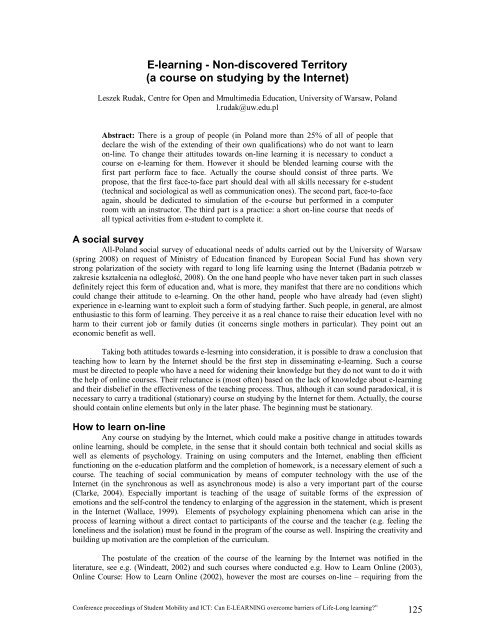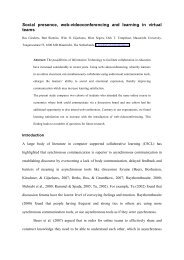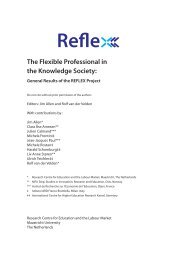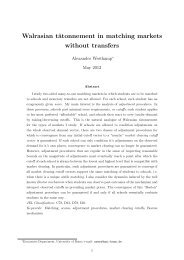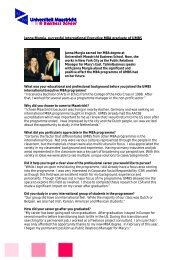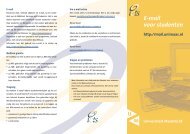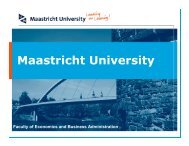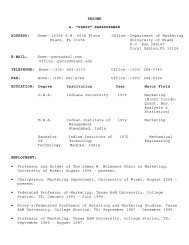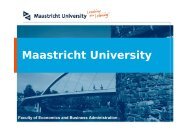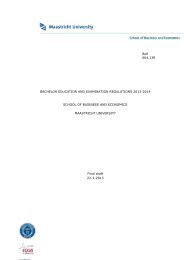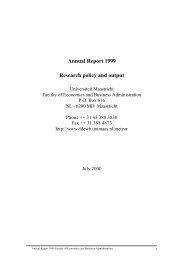proceedings of Student Mobility and ICT: Can E-LEARNING
proceedings of Student Mobility and ICT: Can E-LEARNING
proceedings of Student Mobility and ICT: Can E-LEARNING
You also want an ePaper? Increase the reach of your titles
YUMPU automatically turns print PDFs into web optimized ePapers that Google loves.
E-learning - Non-discovered Territory<br />
(a course on studying by the Internet)<br />
Leszek Rudak, Centre for Open <strong>and</strong> Mmultimedia Education, University <strong>of</strong> Warsaw, Pol<strong>and</strong><br />
l.rudak@uw.edu.pl<br />
Abstract: There is a group <strong>of</strong> people (in Pol<strong>and</strong> more than 25% <strong>of</strong> all <strong>of</strong> people that<br />
declare the wish <strong>of</strong> the extending <strong>of</strong> their own qualifications) who do not want to learn<br />
on-line. To change their attitudes towards on-line learning it is necessary to conduct a<br />
course on e-learning for them. However it should be blended learning course with the<br />
first part perform face to face. Actually the course should consist <strong>of</strong> three parts. We<br />
propose, that the first face-to-face part should deal with all skills necessary for e-student<br />
(technical <strong>and</strong> sociological as well as communication ones). The second part, face-to-face<br />
again, should be dedicated to simulation <strong>of</strong> the e-course but performed in a computer<br />
room with an instructor. The third part is a practice: a short on-line course that needs <strong>of</strong><br />
all typical activities from e-student to complete it.<br />
A social survey<br />
All-Pol<strong>and</strong> social survey <strong>of</strong> educational needs <strong>of</strong> adults carried out by the University <strong>of</strong> Warsaw<br />
(spring 2008) on request <strong>of</strong> Ministry <strong>of</strong> Education financed by European Social Fund has shown very<br />
strong polarization <strong>of</strong> the society with regard to long life learning using the Internet (Badania potrzeb w<br />
zakresie ksztacenia na odleg, 2008). On the one h<strong>and</strong> people who have never taken part in such classes<br />
definitely reject this form <strong>of</strong> education <strong>and</strong>, what is more, they manifest that there are no conditions which<br />
could change their attitude to e-learning. On the other h<strong>and</strong>, people who have already had (even slight)<br />
experience in e-learning want to exploit such a form <strong>of</strong> studying farther. Such people, in general, are almost<br />
enthusiastic to this form <strong>of</strong> learning. They perceive it as a real chance to raise their education level with no<br />
harm to their current job or family duties (it concerns single mothers in particular). They point out an<br />
economic benefit as well.<br />
Taking both attitudes towards e-lesrning into consideration, it is possible to draw a conclusion that<br />
teaching how to learn by the Internet should be the first step in disseminating e-learning. Such a course<br />
must be directed to people who have a need for widening their knowledge but they do not want to do it with<br />
the help <strong>of</strong> online courses. Their reluctance is (most <strong>of</strong>ten) based on the lack <strong>of</strong> knowledge about e-learning<br />
<strong>and</strong> their disbelief in the effectiveness <strong>of</strong> the teaching process. Thus, although it can sound paradoxical, it is<br />
necessary to carry a traditional (stationary) course on studying by the Internet for them. Actually, the course<br />
should contain online elements but only in the later phase. The beginning must be stationary.<br />
How to learn on-line<br />
Any course on studying by the Internet, which could make a positive change in attitudes towards<br />
online learning, should be complete, in the sense that it should contain both technical <strong>and</strong> social skills as<br />
well as elements <strong>of</strong> psychology. Training on using computers <strong>and</strong> the Internet, enabling then efficient<br />
functioning on the e-education platform <strong>and</strong> the completion <strong>of</strong> homework, is a necessary element <strong>of</strong> such a<br />
course. The teaching <strong>of</strong> social communication by means <strong>of</strong> computer technology with the use <strong>of</strong> the<br />
Internet (in the synchronous as well as asynchronous mode) is also a very important part <strong>of</strong> the course<br />
(Clarke, 2004). Especially important is teaching <strong>of</strong> the usage <strong>of</strong> suitable forms <strong>of</strong> the expression <strong>of</strong><br />
emotions <strong>and</strong> the self-control the tendency to enlarging <strong>of</strong> the aggression in the statement, which is present<br />
in the Internet (Wallace, 1999). Elements <strong>of</strong> psychology explaining phenomena which can arise in the<br />
process <strong>of</strong> learning without a direct contact to participants <strong>of</strong> the course <strong>and</strong> the teacher (e.g. feeling the<br />
loneliness <strong>and</strong> the isolation) must be found in the program <strong>of</strong> the course as well. Inspiring the creativity <strong>and</strong><br />
building up motivation are the completion <strong>of</strong> the curriculum.<br />
The postulate <strong>of</strong> the creation <strong>of</strong> the course <strong>of</strong> the learning by the Internet was notified in the<br />
literature, see e.g. (Windeatt, 2002) <strong>and</strong> such courses where conducted e.g. How to Learn Online (2003),<br />
Online Course: How to Learn Online (2002), however the most are courses on-line – requiring from the<br />
Conference <strong>proceedings</strong> <strong>of</strong> <strong>Student</strong> <strong>Mobility</strong> <strong>and</strong> <strong>ICT</strong>: <strong>Can</strong> E-<strong>LEARNING</strong> overcome barriers <strong>of</strong> Life-Long learning?” 125


